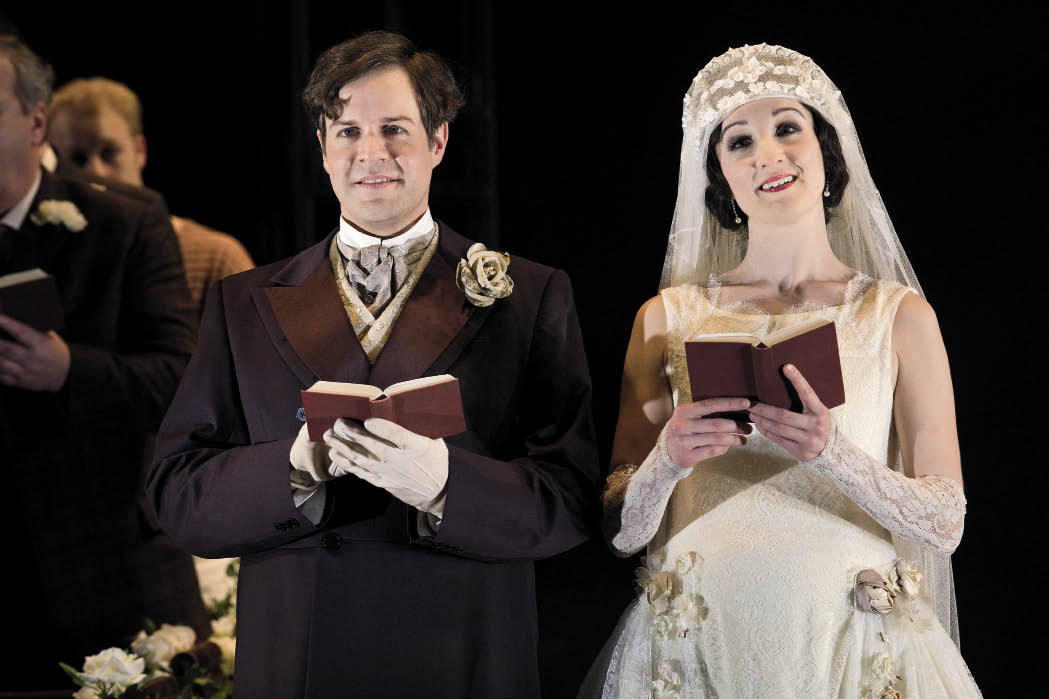Ruddigore
Opera North, touring
What is wrong with me? I kept asking myself that question as I endured the two hours and 40 minutes of Gilbert and Sullivan’s Ruddigore in the Grand Theatre, Leeds, while most of the audience rocked with laughter and regularly burst into delighted applause. I hadn’t originally intended to go, but the reviews were so unanimously ecstatic that I finally decided that I’d better make the effort. This show has been compared to Jonathan Miller’s famous Mikado at ENO, and that is something I see whenever I can and enjoy enormously — but the musical merits of that work apart (they are very high), Miller’s production is a brilliantly sly commentary on the piece, while in no way reducing its stature.
Jo Davies, the director of this Ruddigore, hasn’t attempted any particular ‘take’ on it. Hers is, if anything, a thoroughly traditional G & S show, distinguished by its gusto and by many lively, imaginative touches, such as, during the Overture, a silent movie-style narration with faded photographs, Edwardian period (roughly), of the chief characters. So far, so good: fairly funny, and though the melodies are not first-rate Sullivan, they are agreeable. But when the curtain goes up and the action begins, it’s immediately clear what kind of evening it is going to be. The pure heroine Rose Maybud — a satire, of course, on pure heroines; actually, she is a little schemer — is given a pastel-shaded performance by Amy Freston. She has more voice than she uses here, as I know from having seen her fairly often. But the cast has mainly opted, or been told, to sing in that thin-toned, piping style which suggests that sex would be out of the question, for physiological reasons. Of course with Sullivan, less with Gilbert, you always do feel that sex is not on the agenda. When love is declared by two characters it is expressed by a peck on the cheek, and you can rest assured that it will never go any further. That is one of the things that marks the difference between the satirical operettas of Sullivan and those of Johann Strauss and of Offenbach. Their librettists are less sheerly brilliant than Gilbert, but that may be a good thing. With his incredible verbal facility and penchant for paradox, he doesn’t create characters, he writes clever texts for actors to speak or sing. If there were more than talking or singing for them, that would distract from what Gilbert wants us to concentrate on. And Sullivan is complicit in that, too, in so far as he never seems interested in creating individuals either. As the late Wilfrid Mellers wrote, ‘though Sullivan was adept at characterising in music groups of people — young girls, policemen, bumpkins, and so on — he had little sense of individual characterisation’.
One of the things that I associate with G & S is the peculiar enunciation that the D’Oyly Carte Company practised, widely imitated by local G & S companies all over the UK. I found that trying, and was relieved, in Leeds, to hear the performers speaking in a much more natural (and quieter) manner. After a bit, however, I found I was missing quite a few of the lines, though laughter suggested that many of the audience were not. The old style is necessary, I think, if the singers are to get their tongues round those clusters of consonants Gilbert provides them with. And the words of many of the songs, and all the choruses, were to me almost wholly inaudible.
The acting, on the other hand, is beyond reproach, and the striking scene in Act II where the paintings of Sir Ruthven’s ancestors come to life to remonstrate with him superbly managed, worthy of the impressive music which Sullivan provided for that episode. The central idea of the drama is that the Murgatroyd baronet, to stay alive, has to commit one dastardly act per day. But since this is Gilbert-land, in which the only thing being satirised is melodrama, not life, the present incumbent is too nice to want to commit any dastardly acts at all. I’d thought I would warm to Ruddigore simply because, instead of being an annoyingly good-natured satire on society and manners, it would only be sending up a theatrical genre. But in the event it still shows everyone as pretty nice, even if they have absurd habits. Once again, in Strauss and in Offenbach the satire stings, while here it merely tickles. Hence, no doubt, G & S’s being deemed suitable to take the children to. I don’t know whether children actually enjoy it, but it certainly gives adults a chance to feel that they are reliving their early years.






Comments